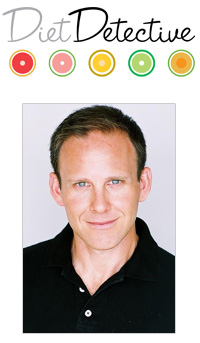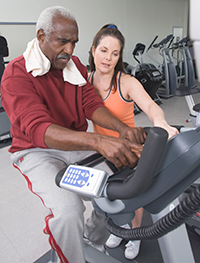 Everything You Need to Know Before You Hire a Personal Trainer
Everything You Need to Know Before You Hire a Personal Trainer
By Charles Platkin, PhD, MPH
Right about now you’re probably abandoning your New Year’s resolution, which means it might be a good time to think about hiring a personal trainer to keep you on track. The biggest problem is that, according to most fitness experts, the majority of personal trainers are not qualified. Unfortunately, the personal training industry is not regulated — so it’s basically a free-for-all. That means you need to do your homework to make sure the person you hire is able to get you to your goal.
Here are a few tips to help you find the right personal trainer:
Research and recommendations — Visit websites of personal trainers in your area; see what they’re about. Also, get recommendations from friends and family.
Certification — There are no state or federal licensing requirements for fitness trainers. Trainers should be certified with 1 of the following: the National Academy of Sports Medicine, the American College of Sports Medicine or the American Council on Exercise. Personal trainers and fitness specialists should also have a background in exercise science, kinesiology, cardiac rehabilitation, biomechanics or adult physical education. Make sure to check that the trainer’s certification is current.
References — Get references with phone numbers from other clients and call them.
Conduct an interview in person — Have a series of questions prepared. Start by asking about the following:
- Qualifications, including certifications and college degrees (Exercise Science).
- How many years’ experience?
- Specific fees, payment options and cancellation policy (in writing).
- Training approach and strategy — will it work for you?
- Availability — are the trainer’s hours convenient?
- What kind of evaluation will you undergo — a performance test? A medical history form?
- Will the trainer be assisting you in developing short- and long-term goals?
- Does he or she have an area of expertise and/or client preference?
- Do you feel comfortable with the trainer? Does he or she listen to you?
Gender — Does gender matter to you? If so, make sure it’s for the right reasons; you’re not there to date your trainer.
Medical conditions — Do you have a specific medical condition? If so, your trainer should be an expert in that area. Additionally, he or she should be willing to communicate with your health care provider. According to ACE, “If you have a medical condition or a past injury, a personal trainer should design a session that accounts for this. If you are receiving care for a medical or orthopedic condition, a personal trainer should obtain your consent to discuss exercise guidelines and contraindications with your health care provider. Your personal trainer should also ask the doctor for medical clearance.”
 More than a babysitter — Make sure your goals for working with your trainer go beyond making you get to the gym. Also, steer clear of trainers who are just wasting time. After several weeks of instruction, you don’t need someone to stand by the treadmill and make small talk — especially not someone you are paying. I often see personal trainers spending more time chatting than talking about techniques and strategies.
More than a babysitter — Make sure your goals for working with your trainer go beyond making you get to the gym. Also, steer clear of trainers who are just wasting time. After several weeks of instruction, you don’t need someone to stand by the treadmill and make small talk — especially not someone you are paying. I often see personal trainers spending more time chatting than talking about techniques and strategies.
Trainers are not nutritionists — Although most top trainers have had some nutritional training, be wary of taking nutrition advice from a trainer. Avoid supplement recommendations — it’s a bad sign.
Do they practice what they preach? Although it’s certainly not the most important quality to look for, you shouldn’t overlook your trainer’s own level of physical fitness.
Define the length of your relationship — You might want to start out by working with someone for 10 weeks to 6 months. Create a clearly defined path to reach your goals.
Is it really personal? Does it seem as if your trainer is just going through the motions or giving all clients the same routine? Your trainer should work with you to understand your body and use that information to develop an individualized program.
Keep it fresh — Your trainer should change your routine and shock your body regularly. Your body adapts to repetitive training stimuli. Change your routine every few weeks. Try some new exercises, and change the intensity of your workouts.
Insurance is mandatory — Many personal trainers operate as independent contractors and are not employees of a fitness facility. You should make sure that your trainer carries professional liability insurance. Fill out an Initial Fitness Assessment: When you’re developing a fitness program, trainers should do some routine fitness evaluations and take a medical history.
Regular accessibility — Trainers should be willing and able to answer some basic questions via email and text, and probably should check on your daily training and provide ongoing motivation.
No pain, no gain — You shouldn’t feel intense pain after a personal training session. Yes, there is pain associated with first-time usage of muscles, but it should be minor.
Trainers should track your workout — The trainer should write down all the exercises you will be doing, how many reps and how many minutes you will have to do each one, how many days per week, etc., as well as what you should be doing daily at home.
The trainer should also chart all your activities. There are many apps that can help, and the chart should be used every time you work out — with or without your trainer.
Take regular body measurements — It’s important to look at measurements in addition to the scale. Most good personal trainers take body measurements during your first session and at least every few months.
Don’t just take the trainer’s word — Make sure you’re doing your workout correctly. There are many websites that have extremely helpful instructional videos on how to do exercises correctly. Discuss some of these exercises with your trainer or ask him to email you a list of the ones he’ll be using so that you can view them online.
Visit:
© Copyright 2015. All rights reserved. Charles Platkin, Ph.D., M.P.H., the Diet Detective, is one of the U.S.’s leading nutrition and public health advocates, whose syndicated health, nutrition and fitness column, the Diet Detective, appears in more than 100 daily newspapers and media outlets in the U.S. Dr. Platkin is also the founder of DietDetective.com, which offers nutrition, food and fitness information. Additionally, Platkin is a Distinguished Lecturer at the Hunter College School of Urban Public Health and CUNY School of Public Health in New York City.